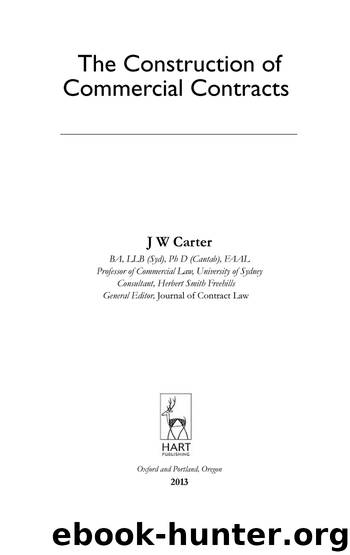The Construction of Commercial Contracts by J W Carter

Author:J W Carter
Language: eng
Format: epub
Publisher: Hart Publishing
Classification of Contracts
[10-06] Simple contracts and deeds. Contracts are classified as being either simple contracts or deeds. Simple contracts are sometimes referred to, at least in the old cases, as ‘agreements by parol’. Contracts expressed in deed form are ‘special contracts’, ‘specialties’ or ‘contracts under seal’.11 This is a classification from the perspective of form. But for the law of contract there is also a substantive contrast, based on the fact that a deed is not subject to the consideration requirement.
When debate as to the nature of the consideration requirement was resolved at the end of the 18th century, it was held that the law does not recognise a separate category of ‘written contracts’.12 However, the object was to reject the view that writing could be a substitute for consideration. Therefore, from the perspective of that requirement, all contracts which are not deeds are ‘simple’ or ‘parol’ contracts, whether or not in writing or evidenced by writing.
[10-07] Documents as written contracts. A contract which is in writing differs from an oral contract which is evidenced by writing. After tracing the history of the concept of a written contract, and the movement from specialties to simple contracts, Wigmore concluded13 that a ‘legal transaction when reduced in writing [is] now to be conceived as constituted, not merely indisputably proved, by the writing’. The contrary view is that contracts not under seal are no more than records. Bramwell B said in Wake v Harrop14 that ‘a written contract, not under seal, is not the contract itself, but only evidence — the record of the contract’. This view was adopted by Isaacs J in Gordon v Macgregor.15 However, it is outmoded16 and, from the perspective of the parol evidence rule, unhelpful. The distinction between a contract in writing and an oral contract evidenced by writing is both meaningful and important.
Under statute, the contrast may be crucial. Some contracts are required by statute to be in writing,17 so that written evidence is not sufficient. But for the purposes of ss 4 and 17 of the Statute of Frauds 1677, written evidence was also sufficient. Accordingly, those provisions required certain contracts (strictly, promises) to be in writing or evidenced by writing.18 Execution of a written contract was therefore contrasted with execution of ‘memorandum or note’ of the contract.
[10-08] When a contract is ‘in writing’. Subject to statute, a contract may be ‘in writing’ in at least five situations.19 First, and most commonly in the case of a negotiated agreement, a contract is in writing if a document expressing the terms of the bargain is executed by both parties as a written contract. It is irrelevant whether the document was read (or understood) prior to its execution.20 Except where counterparts are exchanged,21 execution of the document is generally synonymous with entry into the contract. The document may be executed as a simple contract or as a deed.
Second, the parties may exchange counterparts of a document intended to constitute the contract.22 Whether the document is the counterpart signed by a party, or all counterparts taken together, depends on the parties’ intention.
Download
This site does not store any files on its server. We only index and link to content provided by other sites. Please contact the content providers to delete copyright contents if any and email us, we'll remove relevant links or contents immediately.
The Thirst by Nesbo Jo(5791)
Permanent Record by Edward Snowden(5004)
The Myth of the Strong Leader by Archie Brown(4795)
Spare by Prince Harry The Duke of Sussex(4214)
A Higher Loyalty: Truth, Lies, and Leadership by James Comey(4038)
Secrecy World by Jake Bernstein(3787)
Adulting by Kelly Williams Brown(3678)
The Borden Murders by Sarah Miller(3592)
Fear by Bob Woodward(3261)
Killers of the Flower Moon by David Grann(3252)
The Last Girl by Nadia Murad(3057)
The Secret Barrister by The Secret Barrister(3010)
Future Crimes by Marc Goodman(3005)
American Kingpin by Nick Bilton(2978)
Liar's Poker by Michael Lewis(2816)
The House on Mango Street by Sandra Cisneros(2778)
Graduate Admissions Essays, Fourth Edition: Write Your Way into the Graduate School of Your Choice (Graduate Admissions Essays: Write Your Way Into the) by Asher Donald(2478)
Delicious Torment by Linsey Lanier(2449)
Camino Island by John Grisham(2388)
